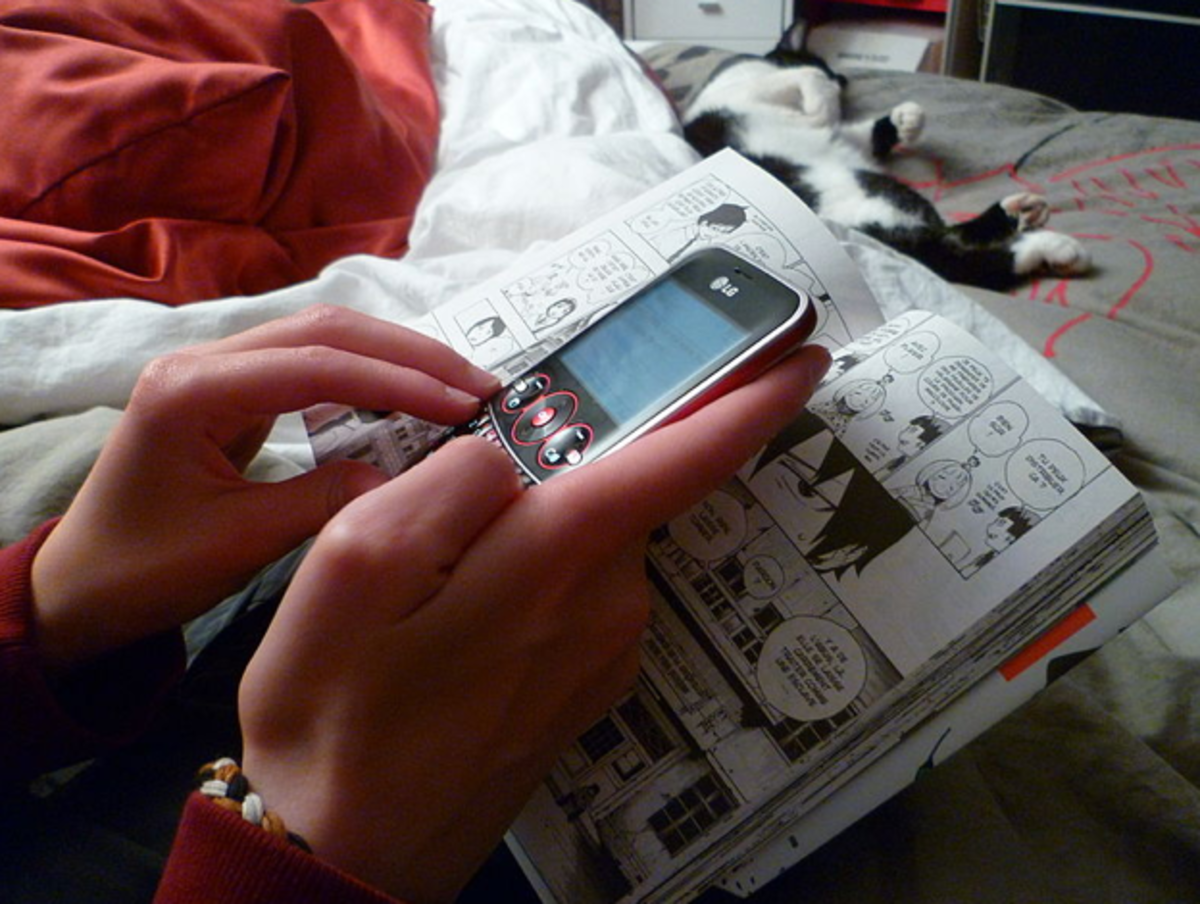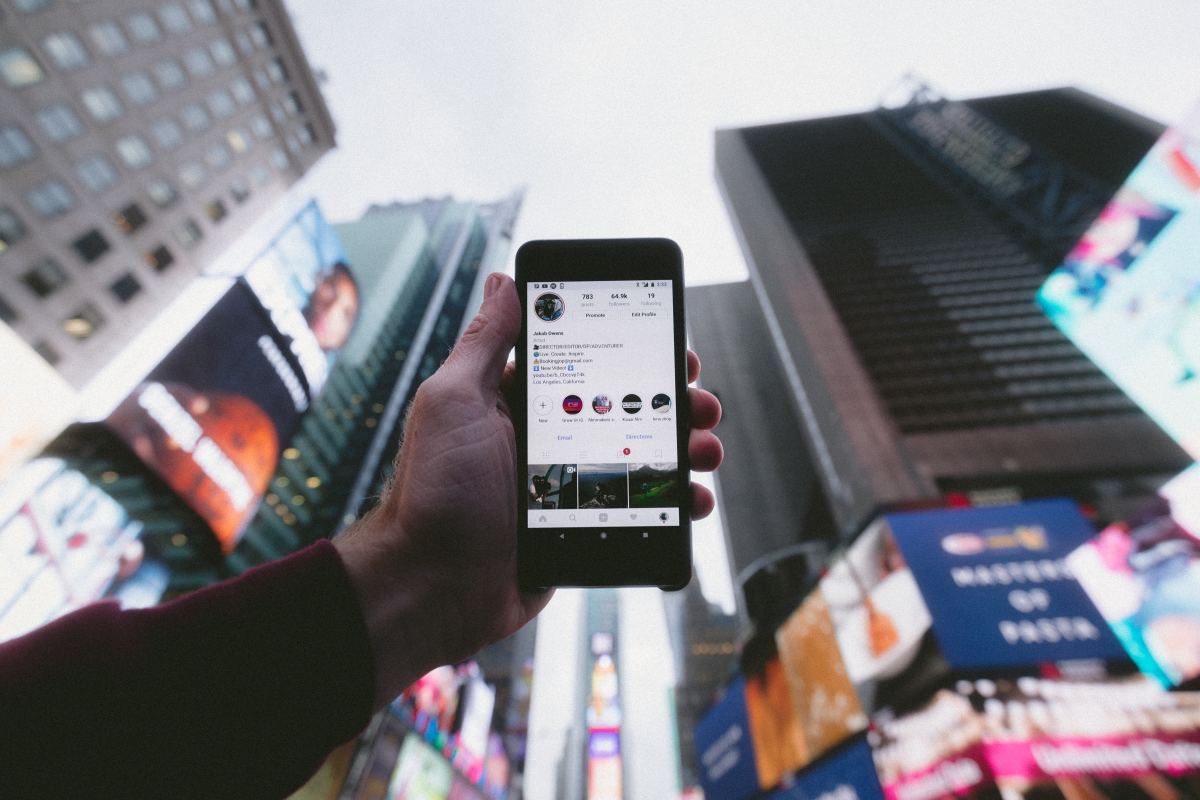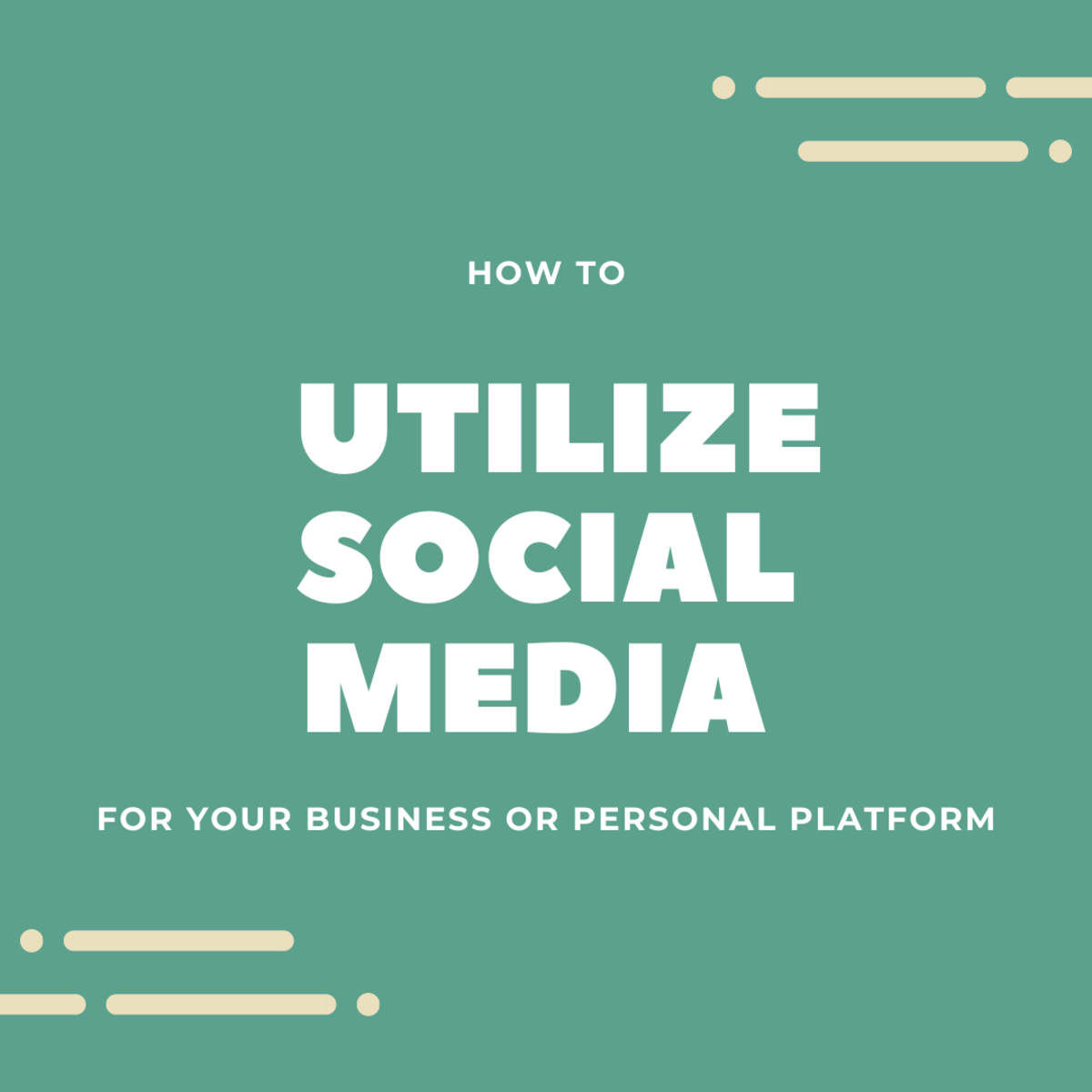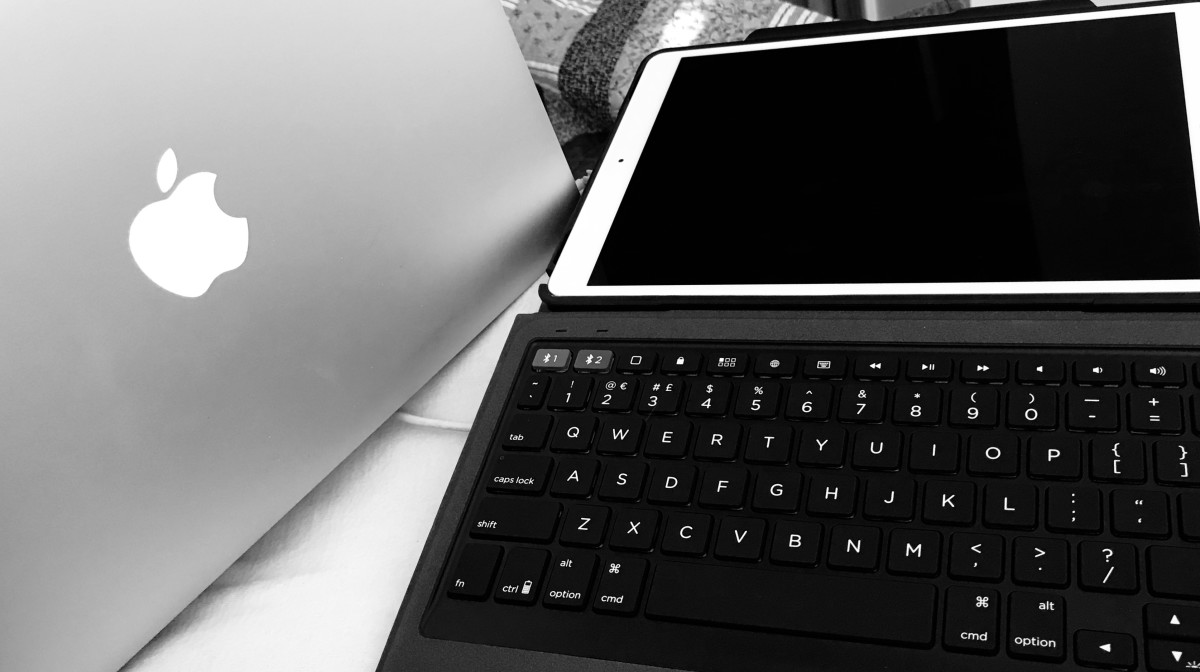How to Avoid Counterfeit Social Media Accounts.
Introduction.
Since sin entered the world, the enemy of God has always been counterfeiting everything. It is no surprise that even in the world today, there will always be a counterfeit of almost everything.
The first time I joined social media, I realized it is just like living in another world. If you are an introvert like I very much was back then, you will immediately fall in love with this new world. But what I noticed is that it is no different to the real world because there still existed negative things like bullying, theft, hacking and so forth.
Despite the negatives, there are also good places where you find inspiration quotes and even a group of people with a common goal like you.
To me the biggest problem that people kept complaining about is fake or catfish accounts. For example, when someone opens an account and pretends to be a man when it is a woman and vice versa. Also, where someone opens an account and pretends to be someone who is well known, with the motive of tarnishing their name or gaining followers.
I would like to address more on my last statement. I will share few tips on how to help your friends and followers find your real account so they may not be tricked and manipulated. I'm also going to share on how to know if the account you want to follow is the real one.
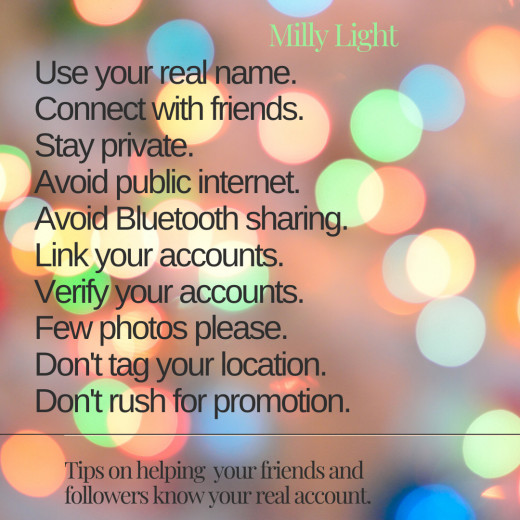
Tips on helping your friends and followers know your real account.
1. Use your real name.
If you are comfortable with this, you can use your real name when opening your social media accounts. If not, then use one real name together with a name that you are also known by. That name could be your maiden name, nickname or even a name that came about after facing a major challenge in your life.
You can also use a name of your business or a name relating to what you love doing. Finally, you can also call yourself the way God calls you in His word. For example, warrior or beautiful.
2. Connect with friends.
Connect with your closest friends who know you very well. You can also connect with family members or business partners. Try to keep the circle small. Remember that your connections can be people you can also trust with your password.
Try to maintain this as your account gets old.
3. Stay private.
Don't reveal much about yourself because you already have friends who know you and that should be enough. Unless you are handling a business, then it is obvious your information might be leaked out by someone else without your knowledge.
You can also reveal more about yourself if you are doing it to encourage someone who admires you or desires to be at the position you are in life. Avoid befriending everyone who you don't know in real life.
4. Avoid public Internet.
For those who love Wifi, try as much as possible not to log in your personal accounts when using public Internet connections. This helps in preventing the collection of passwords and personal data by anonymous people.
5. Avoid Bluetooth sharing.
Bluetooth is used in sharing files from one device to another. I just realized that it is also possible for someone to transfer your contacts from your phone to theirs using Bluetooth when both phones are connected. Although it doesn't work for all devices so don't worry.
Try to find a safer way to share apps and files. Or be careful when using Bluetooth.
6. Link your accounts.
Linking your accounts helps your friends and followers to know all your real accounts. For example, linking Facebook to twitter.
If you have more than five accounts, don't use one account to link all the others. The secret is to link the most important to you first. For example, link your Facebook to your website. Then link the website back to your Facebook. This confirms that both accounts belong to the same person.
Another method is to link your Facebook account to your website and allow your website to link to your Facebook and Twitter. Then allow your Twitter to link to any of your personal blogs. Then allow your personal blog to lead people back to your Twitter account. Simple!
7. Verify your accounts.
By this I don't mean that you need the small blue icon you see on famous social media accounts. I mean verifying your phone numbers and emails. You can use different emails for different accounts.
If all your accounts share the same email. Then make sure your email is secured by a phone number and a recovery email together with a strong password.
8. Few photos please.
Don't put all your photos on social media. Especially family photos, baby photos, marriage photos or even photos of your most happy moments. Keep them in an album and enjoy the memories with your loved ones. Any counterfeit account will not be able to copy your account very well because they lack your photos. It will be difficult for them to pretend they are you.
You can share one or two photos of yourself or your business. Which you might update after a period of time.
9. Don't tag your location.
Avoid tagging your location on every post you make. People don't need to know where you are enjoying a picnic. The don't need to know you are having pizza at a certain restaurant. Nor do they need to know where your latest car is packed.
Not everyone needs to know your dwelling place. This protects you from the paparazzi and people who are a threat to your life. You can save yourself the costs of needing a bodyguard.
10. Don't rush for promotion.
The reason I say this is because any new business account is bound to have a counterfeit. Allow your account to be weeks old or months old as you inform your closest friends about it. Rushing to promote it can make it to be exposed to many people and even to those who are not your target audience.
Letting it grow slowly as you establish trust among the few people you are ministering to will help it have a strong foundation. This means that later when there is a counterfeit account, your friends and followers will immediately know the difference.
Note.
For those wishing to open an account on behalf of someone, just contact the real owner and maybe they will allow you to do so if your motive is good.
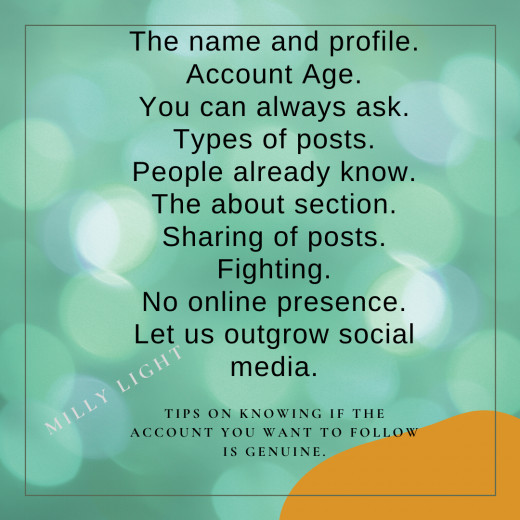
Tips on knowing if the account you want to follow is genuine.
1. The name and profile.
This is the first and easiest way of finding friends on social media. But few accounts have real names and real profile photo. Also, there are counterfeits that obey this rule very well so don't let it be your final tip.
There are also many real accounts without a profile photo or real name.
2. Account age.
How old is the account? Many real accounts are very old and the feed or timeline has posts or photos that confirms that indeed it is real. You can consider accounts that are more than 6 months to 1 year old.
Also, some people open new accounts after their old one gets hacked or deleted. So you can always confirm with your friend face to face if indeed they have an online social media account.
There are also new accounts that people open with the intention of ministering and reaching out to others. In this case, the age of the account will not matter. What you check is the about section and the age of the accounts linked to them. You will notice that a new account doesn't have counterfeits. It only starts having counterfeits when it's online presence starts growing.
3. You can always ask.
You can always confirm with others or the person you want to follow if the account is theirs. This is possible if you have other sure means of contacting the person. Let us not assume anymore like we used to when we were first new to social media.
It is time to protect others and yourself from those whose goal is to destroy other people using social media.
4. Type of posts.
Many real accounts are genuine and most of the account owners have already established a way you will know it is them posting. Fake accounts might post in a way you may sense that the character behind the post is different from the one you know.
It is the same as what happens when an account gets hacked. You find that the new intruder does something that is out of the ordinary. So you can take time to know what is happening before blocking your friend. You might find your friend was hacked without their knowledge.
Call them or email them and ask about the post or message you suspect.
5. People already know.
Before you even try to figure out if an account is fake or real, you might find that people already know. By reading comments and comparing two similar accounts, you will realize people already know the fake and real one.
You will be safe to follow the real one even if the fake one looks genuine. Unless both accounts are handled by the person and their business partners. You can always ask. And it will also be obvious because one account will not be trying to copy the other.
6. The about section.
The about section of any personal account or business account will have enough information for you to know if it was what you were looking for. Also, the information on the about section seems to be the same after a period of time.
The information could be unique too and it confirms the content being posted.
7. Sharing of posts.
When you find two or three similar accounts, you will notice they are linked to each other. If not, the real account will always share the posts of the other accounts. This way, you will know all accounts belong to the same person or different partners of the same organization.
8. Fighting.
You can also find very similar accounts where the people behind them are fighting. One says that their account is the real one and the other says that they are the real one. At this point, don't follow any of them. First, allow the real one to be able to produce a solid evidence that convinces their followers that indeed it is the real social media account.
This can be solved when the person tries to follow some of the points in the first ten steps mentioned here. For example, sharing one of their original account that links to the disputed account for proof.
9. No online presence.
With advanced technology, you will be surprised that there are people who don't even exist on social media. Apart from a phone number and an email, you won't hear about them anywhere else.
I mention this because we are all unique and different. Some people are able to establish a business well or minister to much more people using social media. While some, are blessed wherever they are and are much comfortable with working behind the scenes or in areas where technology is not embraced.
When you know them, you might spot someone on social media trying to pretend to be them very quickly. And immediate action can be taken to protect their reputation.
10. Let us outgrow social media.
After learning all this and together with your personal experiences, you will be able to know the best way to use social media for your benefit and the benefit of others.
If it is doing research for school or business, ministering to others, teaching others and reaching out to those who stay behind closed doors, let us do every work as though we were doing it for the Lord and not men. Let us also not forget to enjoy the beauty of spending time together with our loved ones and friends outside social media.
Final words.
In conclusion, let us not be ignorant or lack knowledge of the harmful ways the enemy can try to attack us or enter our lives through social media. Let us do everything in prayer and in the presence of God trusting that anything we do, He sees and will bless whatever work we do that is surrendered to Him.
May God put a hedge of protection around you and your loved ones and may He never lift His hand of protection from you. As you surrender everything to Him even your social media accounts, let God use them to help others and encourage them.
This content is accurate and true to the best of the author’s knowledge and is not meant to substitute for formal and individualized advice from a qualified professional.
© 2020 Milly Light

